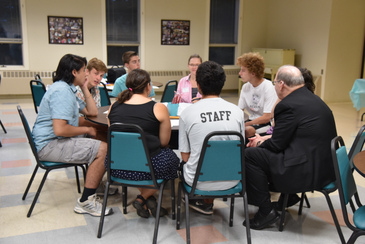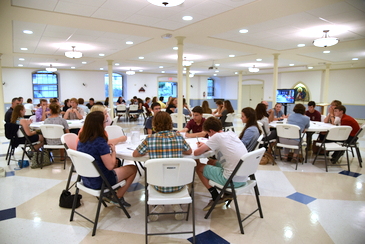From the Bishop - November 2017
Journeying Toward the Synod of 2018

This summer, we did our part to assure that the Holy Father would hear from the young people of Maine. With the good work of our Youth Ministry Office, we gathered together three groups of young people in different parts of the diocese representing many of our parishes so that I could listen to their opinions. The demographic that the Synod will focus on will be those between ages 16 and 29. Our Communications Office coordinated an additional effort to listen to young people through an online survey prepared by the Office of the Synod in Rome and accessible through our diocesan website. Both efforts were successful in reaching young people and hearing of their joys and struggles in the Church today. Almost 200 young people participated in our three listening sessions, and some 335 completed the online questionnaire.

A number of the young people spoke of the need for opportunities to be involved in the social teaching of the Church and in active service activities encompassing outreach to the least of our brothers and sisters. Young people seek to be part of a Church which, as one of them stated well, “answers the Gospel call to service, love and mercy.”
The young people themselves are aware that many of their peers do not practice the faith. Among the realities they report as they talk about their own participation in the Church is the criticism they often face because they are practicing. So, they seek to create in their parishes a place where they can be welcomed and welcome others. Drawing people to the Eucharist and participation in the life of the Church has to be seen as a cause of joy in the life of a person of faith. In this regard, the example of the adults in the community is important. In Maine, we live in the most secular part of the country. There are many people who consider themselves ‘nones.’ They see no need for a connection to any religious community. We are told that some 50% of our young people under 30 who were raised Catholic consider themselves among these ‘nones.’ That is a startling number. Clearly there is no simple way to convince these young people to reconsider their decision, but communities and parishes which are joyful in the celebration of their faith and welcoming to people who come to Church are a good place to start.
This consultation with our young people is the start of the Synod, a process of listening, discussing, and setting goals for the future. We can, however, begin to listen to the young people of our diocese by asking ourselves how open we are to their wish to join with the community in celebrating the beauty and joy of our common faith. In a meeting with youth, Pope Francis encouraged them to speak with their grandparents and ask them about their lives and the difference faith made in their lives. He sees this “bridge of dialogue” between elderly and youth as something needed more than ever. Those conversations are a valuable way of sharing faith. We pray that many such conversations take place over the next year.










